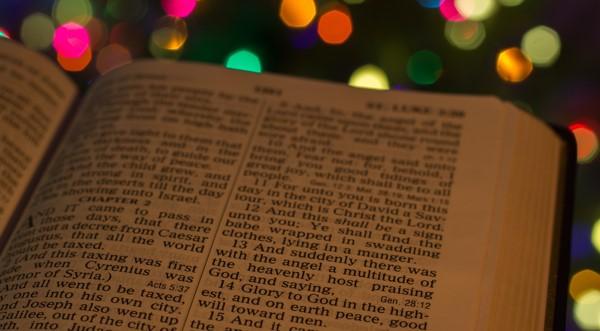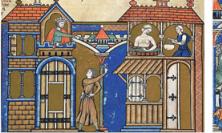The readings chosen for the season of Advent have an important role to play in leading us to the crib. Peter Edmonds SJ describes the shape our liturgical journeys take and encourages us to be attentive to how God speaks through the texts we hear.
Advent calendars take many forms, but the two offered to us by our Advent liturgy should not be ignored. The first is based on the Sunday readings for Advent and the second is one more detailed, consisting of the readings offered to us for the weekdays of the season. Both provide us with a rich and meaningful path to Christmas and invite us to the more profound and wider knowledge of the treasures of scripture which so many of us desire.
Advent Sundays: three ‘comings’
The first alternative invites us to devote the particular weeks to the various ‘advents’ (or arrivals) we contemplate in our preparation for Christmas. The liturgy inverts their natural temporal order. It considers first the coming of Christ at the end of time, then his arrival in Galilee for the beginning of his public ministry, and finally his immediate arrival in this world at his birth.
On the first Sunday of Advent, we hear in successive years extracts from Jesus’s discourse to his disciples about the events that will precede the end and his final coming. On the second Sunday, we hear the proclamation of John the Baptist about the imminent arrival of the one he calls the ‘stronger one’. On the third Sunday, in Year A of the three-year cycle we hear Jesus speaking about John the Baptist, and in years B and C, we hear more of the preaching of the Baptist himself. Only on the fourth Sunday, as we approach Christmas, do we hear about events preceding the birth of Jesus. These texts, especially if we combine them with the carefully selected first and second readings, are rich enough to provide us with suitable material for prayer and reflection during the week that follows each Sunday. They offer us words of life as we keep them in mind during the weekdays that follow.
Advent weekdays: prophetic voices
We can be more ambitious by giving serious attention to the passages selected for the weekdays of Advent. Priority can be given to the first readings from the Old Testament authors. The gospel passages that go with them can be regarded as complementary to these first readings, in contrast to our normal Sunday readings when the first reading is subordinate to the gospel. A suggested pattern for an Advent calendar for weekdays follows.
First week: visions for the future
In this first week of Advent, our first readings are taken from the prophet Isaiah. He was active in the days of King Ahaz and other kings of Judah in the eighth century BCE (Isaiah 1:1). His was a delicate task in view of the superpowers such as Assyria and Egypt, which threatened stability and peace. Isaiah’s message was one of encouragement and sound policy. He put before his kings a manifesto for government. This week, we have access to Isaiah’s vision of what could be: the temple in Jerusalem could become a place of pilgrimage for all nations in a world of peace: spears of war would be turned into pruning hooks of peace (Isaiah 2:1-5; Monday*). Leaders would be enlightened by the gifts of the spirit, becoming agents of ‘wisdom, understanding, counsel and might, knowledge and fear of the Lord’ (Isaiah 11:1-10; Tuesday*). Food and such necessities would be available in abundance (Isaiah 25:6-10; Wednesday). The God whom they worshipped and on whom they depended would be recognised as the rock he was (Isaiah 26:1-6; Thursday*). God had plans for the deaf, the blind and the poorest (Isaiah 29:17-24; Friday). They were to acknowledge their own failures and stubbornness; such defects God promised to heal (Isaiah 30:19-21, 23-26; Saturday).
Our ancestors in the faith treasured such texts from Isaiah because they anticipated the values of the kingdom, which we find in the gospels. The gospel readings that accompany these Isaiah texts demonstrate this. Jesus speaks of people from east and west taking their places at the feast in the kingdom of God (Matthew 8:5-11, Monday*). Jesus himself is filled with the joy of the Holy Spirit (Luke 10:21-24; Tuesday*). He feeds and satisfies the hunger of 4000 in the wilderness (Matthew 15:29-37; Wednesday). He urged those who heard the Sermon on the Mount to build their houses on a rock (Matthew 7:21,24-27; Thursday*). He brought sight to the blind (Matthew 9:27-31; Friday). He commissioned his disciples and sent them out as labourers in his harvest (Matthew 9:35-10:1,6-8; Saturday). The vision of Isaiah takes shape in the healing ministry of Jesus. Christmas reminds us that the kingdom of God has begun.
Second week: coping with disaster
How do we cope with times of disaster? Passages from Isaiah selected for this second week of Advent may help us. We join the exiled Jerusalem community in sixth-century Babylon, trying to make sense of their situation in which they have suffered the destruction of their holy city and the temple, the place where their God had his dwelling. Why has God allowed this to happen? Here is a cry repeated in all ages of the Church, even in our own as we lament the losses of war and pandemic. We read selections from Isaiah 40-55. The prophet recalls us to fundamentals: who is our God? He is our shepherd, our creator and our redeemer. We admit that we have failed in our response. As in the previous week, gospel passages help us to reflect on the prophetic message.
We begin with a passage of celebration, a vivid description of the joyous return home of the exiles, which may well belong to Isaiah 40-55 (Isaiah 35:1-10; Monday). The acclamation of God as shepherd of his people (Isaiah 40:1-11; Tuesday*) invites us to look again at the shepherd chapter of Ezekiel 34 and the shepherd Psalm 23. These texts are the inspiration for Jesus’s description of himself as the good shepherd in John 10:11. God is more than a shepherd. He is the creator, one who never grows weary (Isaiah 40:25-31; Wednesday). We look again at the creation stories in Genesis 2-3 and we ponder Psalm 104, the creation psalm. Generally, however, the Bible has much more to say about God as redeemer (Isaiah 41:13-20; Thursday). God freed his people from slavery in Egypt and made them a people; we repeat the song of Moses (Exodus 15:1-18) in our Easter liturgy. Good prayer includes contrition and confession of stubbornness, hence the lament of God in Isaiah: ‘O that you had paid attention to my commandments’ (Isaiah 48:17-19; Friday). We might remember the sin of Israel at Meribah (Numbers 21:4-9) recalled in Psalm 95, the psalm recommended for the start of each day in the Prayer of the Church. The week ends with a celebration of the prophet Elijah (Ecclesiasticus 48:1-4, 9-11; Saturday). He was a prophetic predecessor of Isaiah; his role will be repeated by John the Baptist about whom we will hear in the week following.
The gospel readings of this week correspond to the prophetic texts that form the first readings. We celebrate the homecoming of the paralysed man to whom Jesus brought healing and forgiveness of sin (Luke 5:17-26; Monday.) Jesus, himself the good shepherd, related a parable about a sheep that was lost and found (Matthew 18:12-14; Tuesday*). He echoes the words of God in Isaiah by promising rest for the weary (Matthew 11:28-30; Wednesday) and brings release through works of mercy (Matthew 11:11-15; Thursday). Yet in his ministry, Jesus met rejection (Matthew 11:16-19; Friday). After the Transfiguration, he identified Elijah with John the Baptist (Matthew 17:10-13; Saturday).
Third week: John the Baptist
Five sets of readings are appointed for this week, but most years they are cut short because of the special set appointed for 17-24 December. We continue with prophetic texts as first readings, but in the gospel readings we hear about the preaching and activity of John the Baptist. All of our gospels start the story of Jesus by telling us about John the Baptist.
We begin the week on Monday with the story of Balaam, unique in the Old Testament as a prophet from a nation alien to Israel (Numbers 24:2-7, 15-17). We take special notice of his words about a star that ‘shall come out of Jacob’. His story prepares us for the story of the Magi who would follow a star (Matthew 2:1-12). We continue with a text on Tuesday from Zephaniah (3:1-2, 9-13) which calls on Israel to ‘rejoice and exult’ because God is in their midst. We notice especially a people described as ‘humble and lowly’, in Hebrew the anawim. Gospel characters such as Simeon and Anna belong in their company (Luke 2:25-38). Our reading from Isaiah (45:6-8, 18, 21-26) on Wednesday has much to say about his God who proclaims: ‘To me every knee shall bow’, words that Paul would later apply to Christ humbled in death, exalted as Lord (Philippians 2:10-11). Our Thursday text from Isaiah 54:1-10 is good news for women who are barren, such as Elizabeth, the mother of the Baptist (Luke 1:7). Our Friday text from Isaiah 56:1-3, 6-8 announces how foreigners and eunuchs are now welcome in the house of the Lord. Such were the Ethiopian eunuch and the many Gentiles who accepted the gospel in the Acts of the Apostles (8:27; 17:30). Jesus quoted this passage in his cleansing of the Temple (Mark 11:17).
The gospel readings afford us various glimpses of John the Baptist, with consecutive readings from Matthew and Luke, and a single text from the evangelist John. We have two passages from Matthew 21. On Monday, Jesus speaks of John the Baptist. He questions the chief priests and elders of the people about John’s baptism: ‘Did the baptism of John come from heaven, or was it of human origin?’ (Matthew 21:23-27). On Tuesday, in a continuation of the same passage, (Matthew 21:28-32), Jesus praises John ‘who came to you in the way of righteousness’. His righteousness surely exceeded that of the scribes and the Pharisees (Matthew 5:20). Then we have two passages from Luke 7. On Wednesday, we hear of John sending messengers to Jesus, asking him whether he was ‘the one who was to come’ and we appreciate Jesus’s reply (Luke 7:19-23). On Thursday, we learn of Jesus’s words to the people, that ‘of those born of women no one is greater than John’ (Luke 7:24-30). On Friday, in the only passage from John’s Gospel proclaimed on an Advent weekday, Jesus publicly commends the Baptist as a ‘burning and shining lamp’ (John 5:33-36).
Fourth week: the Christmas story
There is no formal fourth week of Advent. Instead we are offered a cycle of readings for the days before Christmas (17-24 December). These consist of gospel readings of passages concerned with events before the birth of Jesus, first from Matthew and then from Luke. These are twinned with Old Testament texts recognised as messianic, which throw light on the gospel passages.
We begin with Matthew. On 17 December, we hear his genealogy of Jesus (Matthew 1:1-17), which links the story of Jesus the Messiah with the patriarch Abraham and King David in particular. The first reading (Genesis 49:2, 8-10) relates how the patriarch Jacob, preparing for his death, blessed his sons, including Judah, the son who is included by Matthew among the ancestors of Jesus. On 18 December, we have the account of the angelic annunciation to Joseph, the husband of Mary (Matthew 1:18-24). Joseph was said to be a righteous man, a Son of David. The first reading quotes Jeremiah’s prophecy (23:5-8) of a righteous branch of David’s line.
On 19 December, we begin reading Luke’s Gospel with its account of the angelic annunciation to Zechariah of the coming birth of John the Baptist (Luke 1:5-25). The reading from the Book of Judges (13:2-7,24-25) invites us to compare and contrast the annunciation of the birth of the Baptist with the annunciation of the birth of the prophet Samuel. On 20 December, we hear the best known of these annunciation stories, the visit of the angel Gabriel to Mary, the mother of Jesus (Luke 1:26-38). Background to this account is Isaiah’s meeting with King Ahaz which we have as our first reading (Isaiah 7:10-14) where Isaiah speaks of a ‘young woman [translated in the Greek version as parthenos which means ‘virgin’] with child’. On 21 December, the two prospective mothers meet (Luke 1:39-45). Thanks to the Holy Spirit, Elizabeth is enabled to speak in praise of Mary, and her unborn child leaps in her womb at Mary’s presence. Words from Zephaniah in the first reading (‘The Lord your God is in your midst’) anticipate these events (Zephaniah 3:14-18). An alternative reading comes from the Song of Songs (2:8-14) in which the author rejoices: ‘For now the winter is past, the rain is over and gone’. On 22 December, we hear Mary’s ‘Magnificat’ (Luke 1:46-56), a text that not only reflects previous events, but looks forward to what will happen in the ministry of Jesus. It has echoes of the song of Hannah in 1 Samuel (1:24-28), which is the first reading. On 23 December, we hear of events after the birth of John the Baptist and the drama of his naming by Zechariah (Luke 1:57-66). It is appropriate that the first reading (Malachi 3:1-4,23-24) gives us words from the final page of the Old Testament, which warn how the messenger sent by God will be ‘like a refiner’s fire’. One the morning of Christmas Eve, 24 December, the gospel reading is the canticle of Zechariah, the Benedictus, a hymn which celebrates how God has visited his people (Luke 1:67-79). In all these events, the ancient prophecy of Nathan to King David recounted in the first reading is reaching fulfilment (2 Samuel 7:1-5, 8-12, 14, 16).
Advent calendar: God speaks
It is good to recall the opening of the Letter to the Hebrews, which tells us that ‘long ago God spoke to our ancestors in many and various ways by the prophets’ (Hebrews 1:1). The biblical passages appointed for each day of Advent, forming our Advent calendar, give us an admirable sample of these words of God spoken in scripture. Our Advent prayer is that through pondering them and savouring them, ‘our hearts may burn within us’ (Luke 24:32) when at Christmas, we rejoice in the birth of ‘Jesus the Messiah, the son of David, the son of Abraham’ (Matthew 1:1).
Peter Edmonds SJ is a member of the Corpus Christi Jesuit Community, Boscombe.
* Editor’s note: In 2020, the readings for the following days of Advent are replaced by those for the feasts of the day according to the calendar followed by the Jesuits in Britain:
- First week of Advent, Monday (30 November, St Andrew)
- First week of Advent, Tuesday (1 December, Ss Edmund Campion SJ, Robert Southwell SJ & Companions)
- First week of Advent, Thursday (3 December, St Francis Xavier SJ)
- Second week of Advent, Tuesday (8 December, Immaculate Conception).






